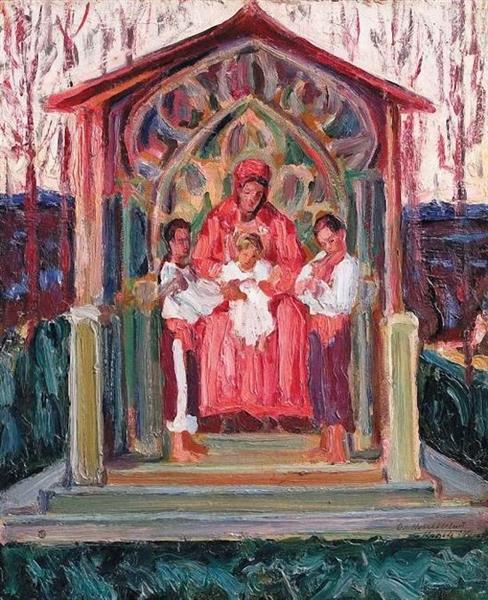Description
The painting "Ukrainian Virgin" by Oleksa Novakivsky, created in 1919, is a work that merges the spiritual with the national, celebrating Ukrainian identity through a visual language that resonates with the tradition of religious art, while capturing the essence of folklore and popular culture of the country. In this painting, the central figure is a contemplative representation of the Virgin Mary, set in an ethereal environment, surrounded by a luminous halo that symbolizes her divinity and purity. This halo is a recurring element in religious art and particularly in Christian iconography, but here it is presented in a way that also refers to the Ukrainian cultural heritage.
The composition of the work highlights symmetry, with the figure of the Virgin predominantly in the center, making her the visual focus of the painting. Novakivsky skillfully handles the color palette, using shades of blue and gold that evoke sensations of serenity and spirituality. Blue, in particular, is a color that not only has religious connotations but is also associated with Ukrainian tradition, representing the sky and the earth. These tones blend harmoniously, creating a subtle yet effective contrast that sharpens the almost celestial appearance of the figure.
The treatment of the Virgin's face is remarkable; her features are serene and with an expression that invites reflection. This representation moves away from traditional European idealism, incorporating elements of Slavic beauty and emphasizing the Virgin's connection to her cultural context. This fusion of religious tradition and the essence of Ukrainian identity is a recurring theme in Novakivsky's work, who often aimed to represent the reality and soul of his homeland through art.
The background of the painting is designed with an effective use of light and shadow, creating an ethereal atmosphere that seems to envelop the central figure. The smooth transitions between shadows and flashes of light generate a sense of depth that draws the viewer towards the figure of the Virgin, creating an almost meditative space. Through this work, Novakivsky achieves a balance between the sacred and the earthly, helping to reinforce the role of the Virgin as protector and mother in the Ukrainian context.
The historical context of the creation of "Ukrainian Virgin" is also of utmost importance. In 1919, Ukraine was going through a period of political and social turbulence, and this work can be interpreted as a symbol of hope and resistance. By invoking the figure of the Virgin Mary, Novakivsky appeals to a figure of unity and comfort in times of difficulty, which resonates deeply with the Ukrainian people. This context gives the painting additional meaning, turning it not only into a work of art but into an icon of Ukrainian cultural and spiritual identity.
In summary, "Ukrainian Virgin" is a work that transcends its mere pictorial status, adapting elements of religious iconography to the particular context of Ukraine. Through its composition, its use of color, and its profound symbolism, Oleksa Novakivsky captures the essence of his time and culture, offering a representation of the Virgin that, far from being simply an object of veneration, becomes a visual manifestation of the resilience and beauty of Ukrainian identity.
KUADROS ©, a famous painting on your wall.
Hand-made oil painting reproductions, with the quality of professional artists and the distinctive seal of KUADROS ©.
Reproduction service of paintings with a satisfaction guarantee. If you are not completely satisfied with the replica of your painting, we will refund 100% of your money.

